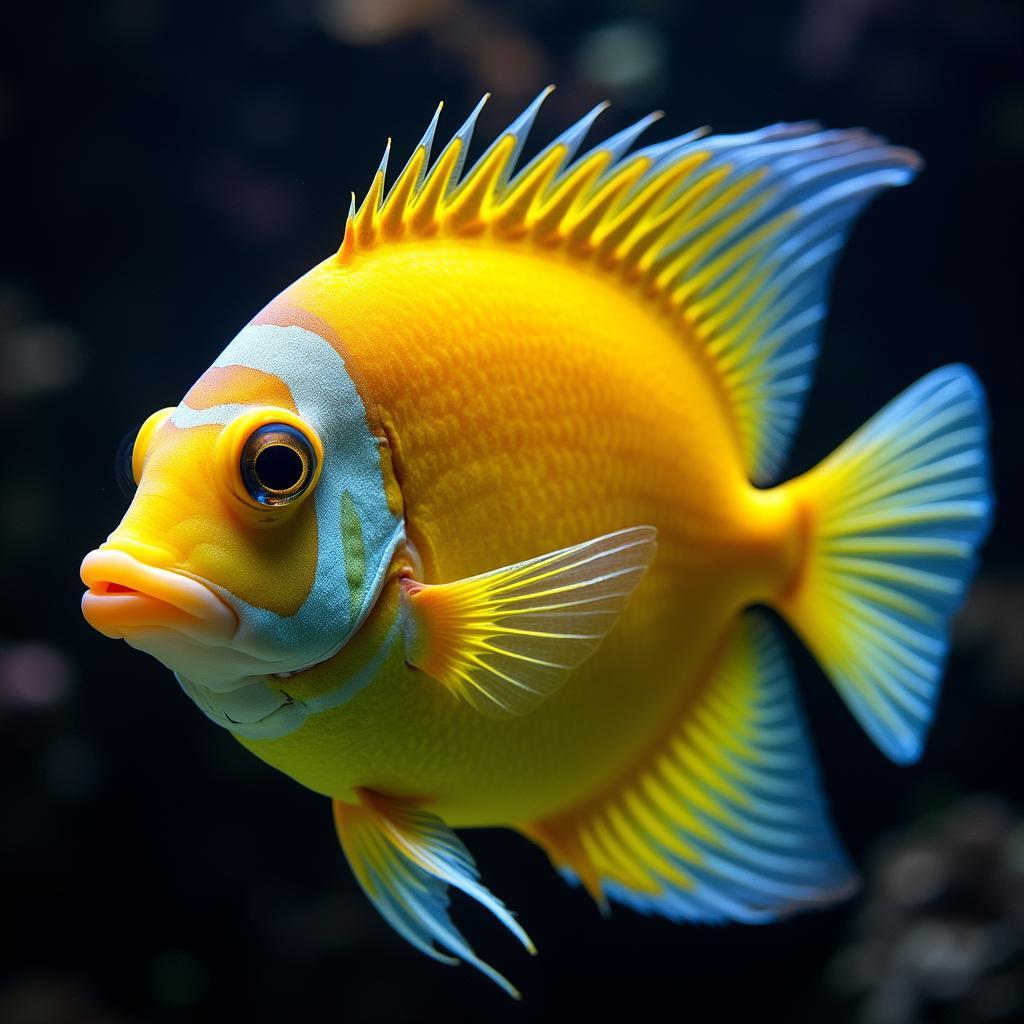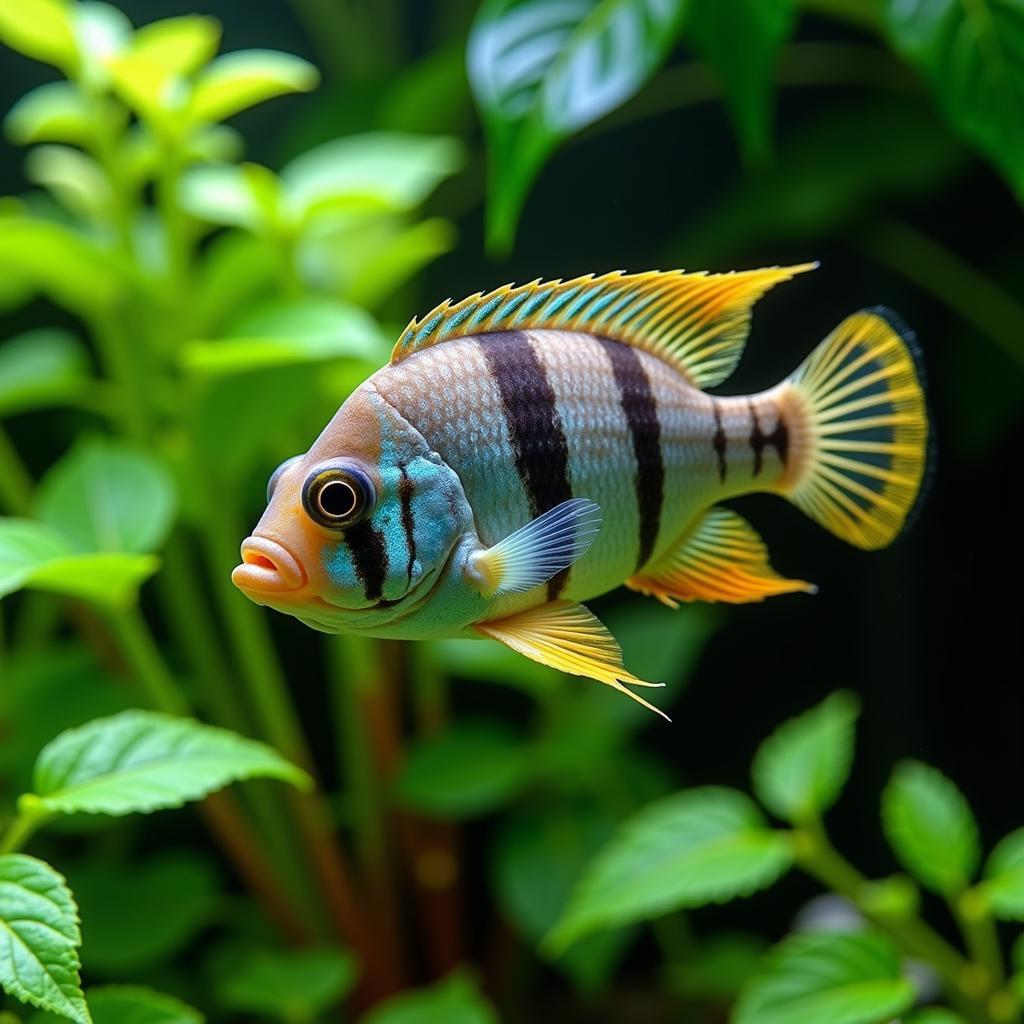Angelfish Best Food is a topic that requires careful consideration. These beautiful, graceful creatures need a balanced diet to thrive in your aquarium, and understanding their nutritional needs is key to their health and longevity. Choosing the right food will enhance their vibrant colors and ensure they live a long, happy life.
What constitutes the best food for angelfish? A varied diet is crucial, mimicking their natural feeding habits in the wild. This includes a mix of high-quality flakes, pellets, and occasional treats of live and frozen foods. Let’s dive deeper into the specifics of angelfish nutrition.
Essential Nutrients for Angelfish
Just like us, angelfish require a balanced intake of proteins, carbohydrates, fats, vitamins, and minerals. Proteins are the building blocks for growth and repair, while carbohydrates provide energy. Fats, in moderation, are essential for healthy skin and fin development. Vitamins and minerals support overall health and immune function. A varied diet helps ensure they receive all the necessary nutrients.
Choosing the Right Flakes and Pellets
High-quality flakes and pellets should form the foundation of your angelfish’s diet. Look for products specifically formulated for angelfish or tropical fish, ensuring a balance of essential nutrients. Check the ingredient list – the first few ingredients should be protein sources like fish meal, krill, or shrimp meal. Avoid fillers like corn or wheat, which offer little nutritional value. You can find some great options for best angelfish food online and in specialty pet stores.
What are the benefits of flakes and pellets? They are convenient, easy to store, and provide a consistent source of nutrition. They also come in various sizes, suitable for different angelfish life stages, from juveniles to adults.
The Importance of Live and Frozen Food
While flakes and pellets provide a good nutritional base, supplementing with live and frozen foods offers several benefits. Live food for fish like brine shrimp, daphnia, and bloodworms are excellent sources of protein and stimulate natural hunting behaviors. Frozen tropical fish food provides a convenient alternative to live food, offering similar nutritional benefits without the hassle of culturing live organisms. These treats can enhance your angelfish’s color and vitality.
Feeding Schedule and Portion Control
How often should you feed your angelfish? Adult angelfish should be fed two to three small meals per day, while juveniles require more frequent feeding, up to four times a day. The key is to provide only as much food as they can consume within two to three minutes. Overfeeding can lead to water quality issues and health problems.
What if My Angelfish is a Picky Eater?
Some angelfish can be picky eaters. If your angelfish refuses a particular food, try offering a different brand or type. Soaking dry food in aquarium water before feeding can also make it more palatable. Patience and persistence are key to ensuring your angelfish receives a balanced diet. You can explore various options for best food for angelfish to find the perfect fit for your finned friend.
Signs of a Healthy, Well-Fed Angelfish
How can you tell if your angelfish is getting the right nutrition? A healthy angelfish will have vibrant colors, active behavior, and a rounded belly (not bloated). Their fins should be full and flowing, and their eyes clear and bright. Regular observation is crucial to detect any signs of nutritional deficiencies or illness.
 A healthy angelfish displaying vibrant colors and full fins.
A healthy angelfish displaying vibrant colors and full fins.
Dr. Aqua’s Insights on Angelfish Nutrition
Dr. Amelia Aqua, a renowned aquatic veterinarian, emphasizes the importance of a varied diet: “Angelfish thrive on diversity. Offering a range of foods ensures they receive all the essential nutrients for optimal health and vibrant coloration.” She also advises against overfeeding, stating, “Overfeeding can lead to poor water quality, which can compromise the immune system and make angelfish susceptible to disease.” Remember, quality over quantity is key!
Ensuring Water Quality for Optimal Health
Maintaining good water quality is essential for the overall health and well-being of your angelfish. Regular water changes, proper filtration, and avoiding overfeeding are crucial for a thriving aquarium environment. A healthy environment complements a good diet, contributing to a longer, happier life for your angelfish.
 Angelfish swimming in a well-maintained planted aquarium.
Angelfish swimming in a well-maintained planted aquarium.
In conclusion, providing the angelfish best food involves understanding their nutritional needs and offering a balanced diet of high-quality flakes, pellets, live, and frozen foods. By following the guidelines outlined in this article, you can ensure your angelfish thrives, displaying vibrant colors and enjoying a long, healthy life. Remember to observe your angelfish regularly and adjust their diet as needed.
FAQ
- How often should I feed my adult angelfish? (2-3 times a day)
- What are the signs of a healthy angelfish? (Vibrant colors, active behavior, rounded belly)
- Can I feed my angelfish only flakes? (While flakes can be a base, a varied diet is essential)
- What are good live food options for angelfish? (Brine shrimp, daphnia, bloodworms)
- How can I tell if I’m overfeeding my angelfish? (Uneaten food sinking to the bottom, cloudy water)
- What should I do if my angelfish is a picky eater? (Try different brands, soak dry food)
- Why is water quality important for angelfish? (It directly impacts their health and immunity)
Do you have any other questions related to angelfish or their nutritional requirements? Consider reading our articles on insect based cat food
For further assistance or personalized advice, please contact us: Phone: 02437655121, Email: [email protected] or visit us at: 3PGH+8R9, ĐT70A, thôn Trung, Bắc Từ Liêm, Hà Nội, Việt Nam. We have a 24/7 customer support team ready to help.